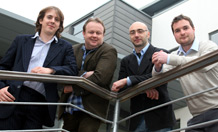
(L-R) Ambrose Buchanan (Event Horizon Ltd), Charlie Adcock (Event Horizon Ltd), Dr Lars Johanning (University of Exeter), Tom Clifford (University of Exeter). Photo by John Ffoulkes.
Cornwall scientists speed up marine renewable testing
A team from the University of Exeter’s Tremough Campus, Penryn, has designed a unique facility that will help deliver reliability and risk control for wave energy device developers, investors and insurance companies.
The first of its kind in the world, the Dynamic Marine Component Test Facility (DMAC) will support the Peninsula Research Institute for Marine Renewable Energy (PRIMaRE) team in conducting research into the feasibility of marine renewable energy in the South West.
DMAC will allow wave energy device developers to identify potential engineering problems and refine their designs more specifically and quicker than has been possible so far.
DMAC is now being built by Somerset-based company Event Horizon Ltd. The twelve-tonne device will be moved to the University of Exeter's Cornwall Campus in late summer 2010.
PRIMaRE is a joint £15 million institute for research into harnessing the energy from the sea, bringing together the technology and marine expertise of the Universities of Exeter and Plymouth. Its team of world-class academic staff and researchers is dedicated to the support and development of the marine renewable energy sector.
The South West RDA and the ERDF Convergence and Competitiveness Programmes are providing the investment for the PRIMaRE venture, whose mission is to become a centre of excellence in marine renewable energy through the delivery of research and technology transfer to business.
Carleen Kelemen, Director of the Convergence Partnership Office said: “The research and innovation of PRIMaRE alongside the construction of the Wave Hub’s ‘socket on the seabed’ will help develop a strong supply chain in this new area of the economy for new and existing businesses in Cornwall. The ERDF Convergence programme’s over £4million of investment in PRIMaRE and its £20million investment in the Wave Hub are part of our commitment to exploiting the economic opportunities of a lower carbon economy.”
Claire Gibson, Director of Sustainable Resources at the South West RDA (Regional Development Agency), which is investing £7.3 million in PRIMaRE over three years, said: “This new facility is another addition to the marine renewables research base we are building in South West England as part of our strategy to become a global centre of expertise for harnessing the power from the sea and one of the best places in the world to set up a low carbon business.”
DMAC is a unique resource for the emerging marine renewable energy industry in the South West. Building on the data generated by the South West Mooring Test Facility (SWMTF) buoy, which is located off the south coast of Cornwall, DMAC will be able to replicate the motions and forces experienced by components of wave energy conversion devices.
In order to establish marine renewable energy in the region, a broad knowledge base of marine components performance needs to be developed. The device will work alongside the South Western Mooring Test Facility (SWMTF) buoy, also developed by the University of Exeter team. Moored off the coast of Falmouth, South Cornwall, the SWMTF gathers detailed information on marine conditions.
Sea conditions measured by the SWMTF can be replicated to identify failure rates by applying accelerated testing. This accelerated testing will allow the researchers to assess the expected lifetime of the component and quickly identify any design weaknesses.
Dr Lars Johanning, a senior lecturer in Renewable Energy and leader of the PRIMaRE Marine Operation group at the University of Exeter said: “This is a major milestone in PRIMaRE’s research and we are excited about the potential the DMAC will have in testing marine energy device components. This project has been awarded to Event Horizon Ltd, a company based in Somerset, which highlights our commitment to support regional businesses. The implementation of this £535,000 project will be challenging but we are looking forward announcing the completion of the DMAC and the first test results this autumn.”
Dr Sue Brownlow, Combined Universities in Cornwall Director added: “In an emerging field like marine renewable energy, access to test facilities such as the DMAC can be a major draw for knowledge based businesses. Benefitting from the research strengths of the Universities of Exeter and Plymouth, PRIMaRE is a tremendous resource for the whole region, and is creating particular opportunities for Cornwall, building on the investment made in university education in the county in recent years. Through pioneering undergraduate and postgraduate programmes in the county, particularly the University of Plymouth accredited Foundation Degree in Renewable Energy Technologies, run by Cornwall College, and University of Exeter’s Renewable Energy degree programmes, Cornwall is also developing the skills base to support a growing renewable energy industry.”
Date: 24 February 2010
